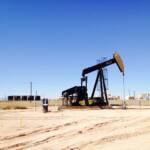Cumulative Impacts has been a major focus of 350 Colorado
 350 Colorado and other groups spent a good part of 2022 working to make sure that the Colorado Oil and Gas Conservation Commission (COGCC) would follow the mandate of SB19-181 and make rules that would address cumulative impacts. Their 2021 Cumulative Impacts Report showed that they were not thinking of cumulative impacts the way most people would. They were not looking at the impacts of oil and gas over time, and they were not looking at how oil and gas pollution interacts with and adds to pollution from other sources.
350 Colorado and other groups spent a good part of 2022 working to make sure that the Colorado Oil and Gas Conservation Commission (COGCC) would follow the mandate of SB19-181 and make rules that would address cumulative impacts. Their 2021 Cumulative Impacts Report showed that they were not thinking of cumulative impacts the way most people would. They were not looking at the impacts of oil and gas over time, and they were not looking at how oil and gas pollution interacts with and adds to pollution from other sources.
350 Colorado staff, volunteers, other members of the public and allied groups worked tirelessly to call attention to this and demand better. We commented in meetings, gave verbal testimony, sent in a letter with 30 allies to the Commission, petitioned them with 5 other groups to make new rules on this issue, commented in their January hearings about this issue, and are collaborating with a group of allies on next steps. But the COGCC’s 2022 Cumulative Impacts Report shows no change from the philosophy of the 2021 report.
The new report did not incorporate any of the suggestions of the letter we submitted with 30 other groups. It also showed that pollution per well is getting worse, not better!
Comparing 2022 to 2021, water use per well rose by about 25%, pre-production nitrogen oxides emissions per well almost doubled, pre-production volatile organic compounds per well went up, pre-production methane emissions per well more than tripled, pre-production hazardous air pollutants per well tripled, production methane emissions more than doubled, and production hazardous air pollutants emissions went up by 50%.
350 Colorado submitted comments on the report to the Commission
In our comments we called out the increased pollution per well and including the following points:
 The 2022 report did not incorporate any of the suggestions from the letter from 31 environmental groups.
The 2022 report did not incorporate any of the suggestions from the letter from 31 environmental groups.- Director Murphy says that the purpose of the report is to establish a baseline. We disagree that it can establish a baseline because it only includes data on 47 Oil and Gas Development Plans that were approved in 2022. It does not include data on all existing wells and it doesn’t include data that includes other sources of pollution and existing pollution in different areas.
- The Director decided not to include the wells that were approved under Comprehensive Area Plans (each CAP includes hundreds of wells grouped into dozens of Oil and Gas Development Plans. The Oil and Gas plans will be submitted gradually over the next 10 years and won’t be included in the Commission’s report until then). We disagree with this decision.
- We asked them to take note that their report shows hundreds of millions of gallons of water per well are being used by oil and gas during a drought. We asked them to report on how much of that water is being polluted and/or permanently removed from the hydrologic cycle.
- The report showed average per-well emissions were greatest in the Front Range, and states that horizontal drilling (for fracking) increases emissions. We pointed out that is another reason to question why so many horizontal wells are being approved.
- The report showed over 1/3 (35%) of the OGDPs approved were within 2000-ft of a home. We asked the Commission to stop granting exceptions to the 2000-foot set back rule.
- The report cites the Air Pollution Control Division data on emissions. The report says the data from 2021 is based on reports from 145 companies, but fails to say that is less than 50% of operators (most didn’t turn in their required report). In 2022, 187 reports were submitted, again, far short of the total number of operators. The Commission should be aware of that and how it impacts the Cumulative Impacts Report.
- The report analyzes well plugging as a benefit, so we pointed out that the benefit of plugging wells does not weigh equally against the establishment of new wells – by the time wells are plugged, most wells are not emitting very much and are not using water. Additionally, all new wells will lock greenhouse gas emissions for decades, at a time when the International Panel on Climate Change and the United Nations Environment Programme have both determined that globally, new production needs to stop now.
Learn more about this issue
See our full letter to the Commission here. Read more about our efforts in these articles:
Enviro Groups ask State to Widen the Scope when Evaluating Harmful Impacts of Oil and Gas Industry
Groups to COGCC: Limit Oil and Gas Development as Needed to Address Cumulative Impacts
Enviro Groups Petition State to Protect the Air on High Pollution Days
COGCC Seeks Comments on Cumulative Impacts Proposal
What next?
The COGCC has said they will form a task force on cumulative impacts, with the possibility of conducting a rulemaking (even though at the December 13 hearing on our petition they said will do a rulemaking). Stay tuned to hear more about how that is developing – and join the “climate policy and regulatory action committee” for opportunities to comment to the COGCC, other agencies, and the legislature (click here and check the 6th committee on the list).
Want to deepen your connection to the Beyond Fracking movement? Click here to sign up to join the 350 Colorado Fracking Action Committee (check the first committee on the list). Or send an email to Bobbie@350Colorado.org to learn more!
Take Action Now! Sign on to a support letter for the concept of phasing out new oil and gas permits by 2030, and pledge to sign a ballot initiative to achieve this.
by Heidi Leathwood
